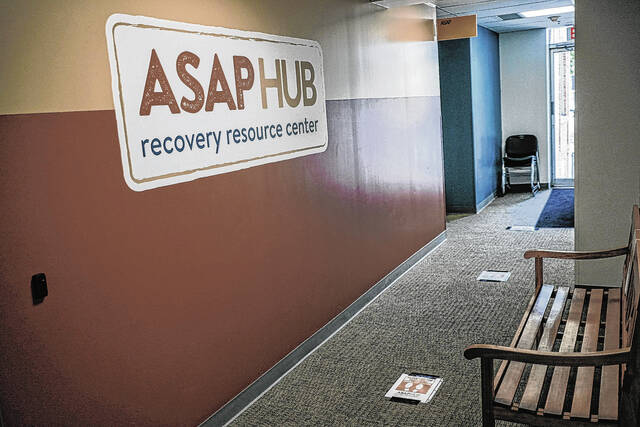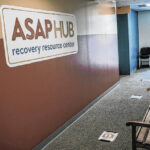
Mike Wolanin | The Republic A view of the hallway leading to the entrance of the Alliance for Substance Abuse Progress Bartholomew County Hub in Columbus, Ind., Monday, June 15, 2020. Mike Wolanin | The Republic
 Mike Wolanin | The Republic A view of the hallway leading to the entrance of the Alliance for Substance Abuse Progress Bartholomew County Hub in Columbus, Ind., Monday, June 15, 2020. Mike Wolanin | The Republic
Mike Wolanin | The Republic A view of the hallway leading to the entrance of the Alliance for Substance Abuse Progress Bartholomew County Hub in Columbus, Ind., Monday, June 15, 2020. Mike Wolanin | The Republic
The Alliance for Substance Abuse Progress (ASAP) is re-evaluating its strategy and efforts to combat the community’s decades-long drug crisis while grappling with a historic rise in overdose deaths fueled by a more dangerous drug supply and the pandemic.
The re-evaluation is largely in response to the fast-evolving drug crisis, including the growing prevalence of fentanyl in the Columbus area. ASAP officials and its board are discussing how to expand the organization’s role since forming in 2017 as a community-wide response to address substance use disorder.
Fentanyl is a synthetic opioid that is more potent than heroin but much cheaper to produce and distribute and is quickly becoming the “primary fatal drug in drug overdoses,” local officials say. The drug also is finding its way into other drugs like methamphetamine, cocaine, marijuana and counterfeit prescription medications, making them cheaper, more addictive and deadlier.
Officials fear that a continued influx of fentanyl in the community will continue to accelerate a crisis that has killed at least 156 Bartholomew County residents since 2015, including a record 33 last year.
But despite the rise in overdose deaths, the ASAP Hub, located in the Doug Otto Center at 1531 13th St., has not seen a similar increase in foot traffic, “which has really led us to re-evaluate our strategy,” said ASAP Executive Director Sherri Jewett.
“Things have changed in the last five years, and the drugs of choice have changed,” she said.
“We were established to be a support for people in crisis,” Jewett said. “(We’re) starting to expand that role and purpose to look not just at people who are in crisis, but people who are on that path. People who haven’t lost everything, but yet they’re increasing their substance use. Providing them information and providing them support may be our next direction.”
Some of the new efforts that ASAP is planning or considering include adult education and prevention campaigns targeting recreational drug users who are not yet experiencing a crisis. Also being considered is expanding emergency harm-reduction measures, including the possibility of making fentanyl test strips available to the public similar to naloxone, a nasal spray that can temporarily reverse an opioid overdose.
Fentanyl test strips can test whether drugs contain the synthetic opioid. Some harm reduction programs use the strips to warn drug users of the presence of fentanyl, as many people are unaware that they are using the drug.
Unintentional use of fentanyl is believed to be a major driver of overdose deaths.
“We 100% are not condoning drug use,” Jewett said. “We are providing harm-reduction tools when we provide Narcan (naloxone). Should we be looking at doing the same things with fentanyl test strips if it’s going to impact the overdose deaths? We will be evaluating that as just another option to try and reduce the deaths.”
The update from ASAP comes as data from the Bartholomew County Coroner’s Office shows that the county may once again be on pace for a record number of overdose deaths this year.
From Jan. 1 to March 9, there were three confirmed overdose deaths and six suspected overdose deaths that are still under investigation, according to the coroner’s office. That would potentially put the county on pace for 48 deaths this year, which would be the highest on record and the third consecutive year of record highs.
Bartholomew County Deputy Coroner Jay Frederick characterized the start to the year as “grim,” but cautioned that the six suspected deaths are still under investigation, with toxicology results pending.
“Unless the trajectory changes, we’re sadly on our way to another record,” Frederick said.
And those numbers could have been even higher, Dr. Kevin Terrell, medical director at Columbus Regional Health’s Treatment and Support Center (TASC), which offers a range of outpatient treatments for substance use disorders.
“I saw two new patients yesterday who had overdosed on opioids in the past week,” Terrell said. “Fortunately, they had people with them who administered naloxone or Narcan. Without immediate naloxone, there could have easily been two more overdose deaths in the past week.”
Terrell said that fentanyl is the main opioid used by new patients at TASC. Many of the patients didn’t know they were using fentanyl until they saw the results of their urine screening, often mistakenly thinking they were using heroin.
Though largely overshadowed by the pandemic, the nation’s opioid crisis has been getting worse. More than 100,000 Americans are now dying from overdoses per year, up from 52,000 in 2015, according to the Centers for Disease Control and Prevention.
In Bartholomew County, deaths from drug overdoses have nearly doubled over the past few years — from 17 in 2018 to 33 last year.
And some local officials now fear that an influx of fentanyl-laced pills disguised as Percocet, Adderall, Xanax, oxycodone and other prescription medications that is being seen across much of the country could be the next wave in the local drug crisis.
“Opioids continue to devastate our community, even with the significant expansion of prevention, treatment and recovery services in our county,” Terrell said.
Terrell and Jewett are urging to people who are using drugs to seek help and encouraging friends and family of drug users to get Narcan, which is available for free at the ASAP Hub or in public dispensers called NaloxBoxes outside the United Way offices, 1531 13th St., and the Bartholomew County Public Library, 536 Fifth St.
“We will give Narcan to anyone who comes (to the ASAP Hub) and asks for it,” Jewett said. “We don’t ask questions. We don’t ask for their name. If they don’t want to come into the Hub and get it, we have two NaloxBoxes, one here by the United Way entrance and one at the library, and we make sure that those are full of Narcan. You can pick it up completely anonymously. If there is a parent, a partner, a spouse who’s worried about someone in their family or someone that they know using, then we highly suggest having Narcan on hand. …It may save someone’s life.”
ASAP officials, for their part, hope that the record number of overdoses deaths that the community has seen over the past two years does not become the new normal, but characterized the current state of the drug crisis as “very scary.”
“We just don’t know yet if that is a new normal,” Jewett added. “We hope not. …It’s very scary.”
Pictured: An exterior view of the Alliance for Substance Abuse Progress Bartholomew County Hub on June 15 in Columbus. Mike Wolanin | The Republic
Mike Wolanin | The Republic A view of the hallway leading to the entrance of the Alliance for Substance Abuse Progress Bartholomew County Hub in Columbus, Ind., Monday, June 15, 2020. Mike Wolanin | The Republic
Mike Wolanin | The Republic Sherri Jewett is the new director of Alliance for Substance Abuse Progress Bartholomew County.
Jay Frederick
Mike Wolanin | The Republic Dr. Kevin Terrell poses for a photo in his office at the Columbus Regional Health Treatment and Support Center in Columbus, Ind., Wednesday, June 9, 2021. Dr. Terrell is the medical director of the center.









